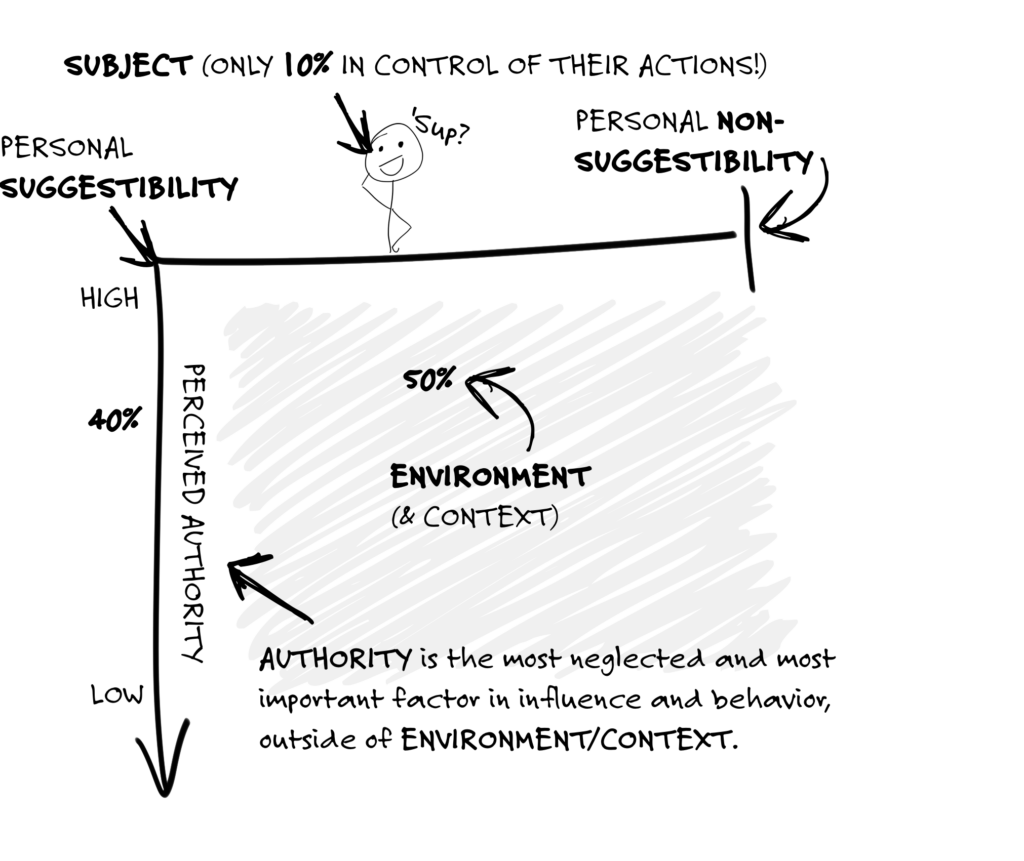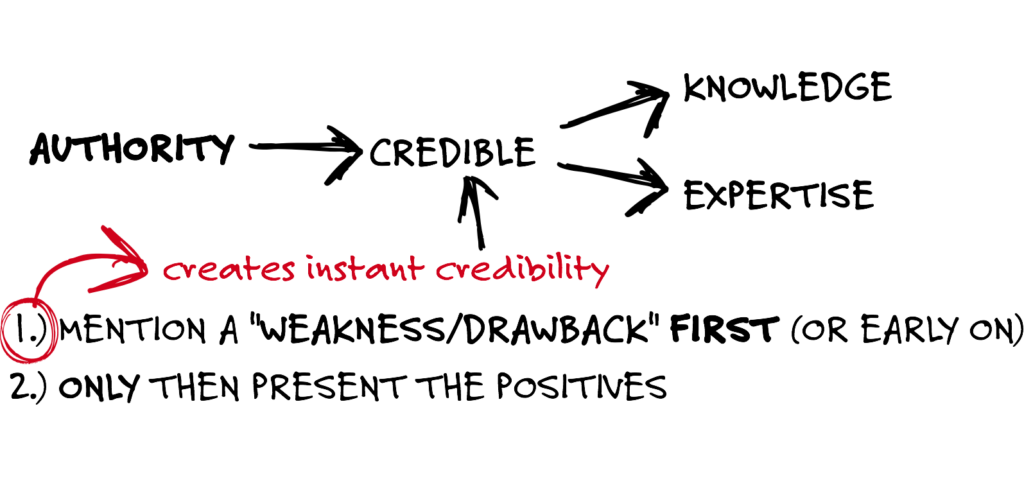AUTHORITY is a very powerful frame to establish early on. Some elements of authority are subtle and implied. Others are conveyed almost instantly.
When you are viewed as an expert your advice, suggestions, and recommendations are more likely to be accepted.
“Follow an expert.” — Virgil
I establish authority mainly through the Strategy of Preeminence (more about this next).
I position myself early on as someone worth paying attention to. Worth listening to. Worth following deeper down the rabbit hole.
When you do this well, you get to differentiate yourself from competitors.
Borrowed Credibility
The easiest and fastest way to start this process is using borrowed credibility from other properties or people who are already established with perceived authority.
For example, if J. K. Rowling or Stephen King said this about me:
“Andre is probably the best unknown writer in the business. Read everything he writes.”
… and then I put that as the FIRST THING people saw when they landed on a website of mine, it would completely change the FRAME of how people see me (and my writing). Instantly.
Sadly, neither J.K. or Stephen have said that about yours truly. I’ve got my fingers crossed, tho. lol.
So instead, I leverage the fact that I’ve been featured and published on various brand websites that people know and trust.
You’ll probably notice I use this image at the top of most of our web properties:

And I keep adding to it.
It’s not too challenging to get an article featured on sites like Inc, The Huffington Post, Time, Business Insider, About, Forbes, Fox, etc.
Start by listing websites that mean something to the audience you’re trying to attract and influence.
For example, if it’s fitness, try to get featured in Men’s Health, LIVESTRONG, and Bodybuilding.com. Just having accreditations from these three brands would instantly boost your “reputation.”
All things considered, doing this is a pretty easy win, and well worth doing.
Perceived Authority
Many years ago I watched a video of Kevin Hogan (an expert in the psychology of persuasion and influence) explaining how PERCEIVED AUTHORITY can have a dramatic influence over the SUGGESTIBILITY (and acceptance of a message) of a subject.
This image illustrates what Kevin explained in that video.

The Y axis is PERCEIVED AUTHORITY; from high perceived authority (top left) to low (bottom left).
For example, a TIME logo would have a high perceived authority; whereas maybe NPR would be lower down.
And having a New York Times #1 Bestseller logo would universally be considered HIGH on the perceived authority scale.
The X-axis is PERSONAL SUGGESTIBILITY.
And this is one of the reasons I work so hard to establish a level of perceived authority as quickly as possible.
Let me explain how this works.
Have you ever seen a ‘celebrity’ in the Internet Marketing space comment on Facebook (or wherever) — and even though it’s not all that profound or anything — the crowd responds with praise and hi-fives?
I’ve seen this happen with Frank Kern, Jeff Walker, and many others.
Yet…
If anyone else had made THAT SAME COMMENT, it would have had near zero impact. People wouldn’t have even battered an eyelid.
“Go buy FB ads and drive them to a webinar.” — Frank Kern
“Go buy FB ads and drive them to a webinar.” — John Smith
There’s a (huge) difference — because of perceived authority.
Frank is right up at the top of the Y axis (high perceived authority) in the IM ecosystem. Which increases the SUGGESTIBILITY of the subject (X-axis).
If you have no perceived authority, the subject (prospect) is essentially NON-SUGGESTIBLE in terms of your ability to persuade and influence them (far right).
Make sense?
Here’s a stupid far out example, but illustrates the point…
Let’s say Barack Obama was privately given hypnosis training to a level of mastery where he could put a subject under hypnosis.
A random subject is called to the stage and asked to sit on a chair.
Then Barack Obama walks onto a stage (without his twenty secret service agents) and tells the subject he is going to put him into a hypnotic trance.
We all agree that Barack Obama probably has a high level of authority in the free world, right?
Yet it’s highly unlikely — even with his newfound skill and ability — that Obama would be able to get the subject into a trance.
Frustrated, Obama quits after 5 minutes.
Then on walks the infamous Derren Brown, who the subject KNOWS well by REPUTATION.
Derren walks up to the subject and puts his hand on the subjects head, and says, “When I reach the count of 3 you will go to sleep until I say ‘wake’. 1, 2, 3!”
… and BOOM! The subject instantly goes under.
Took all of 5 seconds.
See what has happened?
Although Barack Obama has higher absolute authority than Derren Brown, Derren has infinitely more perceived authority on the subject of “mind control” and hypnosis. He’s a legend.
Still with me?
For this reason, establishing and earning perceived authority on the subject (as quickly as possible) is VERY IMPORTANT.
Cialdini’s 6 Principles of Influence
Dr. Robert Cialdini, in the prerequisite reading, Influence: The Psychology of Persuasion, lists authority as one of his 6 Principles of Influence.
Cialdini maps out authority like this:

Someone is considered an AUTHORITY because they’re CREDIBLE, which is a result of KNOWLEDGE & EXPERTISE.
Which means, by deduction, demonstrating knowledge and expertise create credibility, which then reinforces the principle of authority.
To convey instant trustworthiness to an audience in which you have NO HISTORY OR CONTEXT, Cialdini says to lead with a drawback.
This establishes TRUST.
If you mention a drawback you’ve showed people you’re knowledgeable about the cons, and that you’re trustworthy enough to talk about the weaknesses up front.
When I do this, I like to tee up the negative to be a huge positive. I get the kudos from leading with the negative, and it tees up the positive to be even more favorable (compare and contrast).
(Extract from TLB 1.0: The Course.)
“Before you continue, I want to respect your time by coming clean about what this isn’t and giving you the “bad news” first. What I’m about to share with you won’t make you rich quickly. It’s not easy. And most people will quit before making one dollar. Chances are you’ll quit, too. That’s the bad news out of the way. Now here’s how to build a business that is guaranteed to allow you to quit your 9-5 job within 12 months from now.”
(Extract from a golf presell.)
“This is not the typical golf swing instructional training. The truth is, when you follow what I am about to teach you, you WILL LOSE 20% off your driving distance. That’s the bad news. The good news, however, is that your drive accuracy will increase by 600%. And you will drop 10 shots off your average round.”
Three Factors That Trigger the Authority Principle
Dr. Cialdini goes on to talk about three factors that trigger the authority principle:
- Titles — Dr., Prof., Ph.D., President, Chairman, Founder, CEO, Industry experts,
- Clothes — Uniforms, Suits, religious outfits (worn by pastors, monks, nuns, priests),
- Trappings — Accessories that go along with certain positions/roles (e.g., police badges, religious robes, rosaries, expensive suits, nice cars, etc.)
I don’t use #1 all that much. If I had a Ph.D. I guess I would. But I’m also not a doctor, so can’t leverage that either. And titles like CEO and founder don’t carry much weight (even a one-man operation can call themselves CEO).
If you’re a medical doctor or Ph.D. then definitely leverage those credentials. I would.
For #2 I don’t leverage “clothes” per se. Instead I “dress” my sites and presells in a way that stands out and looks awesome and minimalist. I do this in a way that’s unique to our brand and me.
Mindvalley also builds beautiful looking websites. Design matters.
As for #3, I leverage “trappings” from time to time. But I never do it overtly. I don’t drive a Ferrari or a Lamborghini, and even if I did, I wouldn’t take pictures of me in it.
Yes, it may impress some people. And, in some markets, it works. But, in general, it often just results in being labeled an a-hole.
I’m more subtle.
Now that I have established the easy credibility wins very quickly, I move on to the Advanced Strategy of Preeminence.
This is where you get to demonstrate deep knowledge and expertise through preeminence.
And this is where the game changes.
NEXT: Advanced Strategy of Preeminence